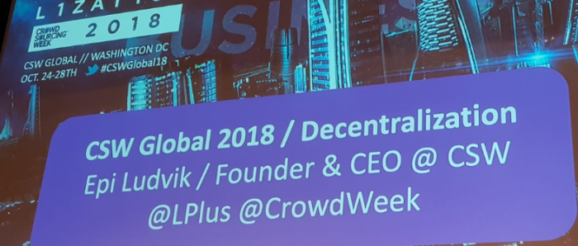Business and Innovation themes rang through at CSW Global 2018

Can we ever balance the power between man and machine or, perhaps, even use technology to balance the power among men themselves? It was a rousing first day of conference at CSW Global 2018, all building up to this same question. The many speakers tackled job opportunities, scientific breakthroughs, government representation, and others topics, looking at the crowdsourcing opportunity from all angles.
Oren Alazraki, Horizon State founder and CEO, knows the power of blockchain in his startup and boiled down the responsibility down to three basic tenets: Transparency is not enough, codify your trust; Emotional code is more important than bug tolerance; and Define your package, and master its delivery. Leading the charge in blockchaining voting, Alazraki says that we need to establish trust, build emotional bonds, and create definitive boundaries and desired outcomes to truly represent the people well.
The discussion of representation continued when Alazraki, Rob Israch of Tipalti, and The Hayzlett Group founder Jeffrey Hayzlett conducted a roundtable on the decentralization of business and governance. One of the big conclusions was that the most successful crowdsource-utilizing businesses could not be in full control. “If you try to control everything, you won’t grow,” Israch said. “And if you wait for the product to be perfect, you won’t make it.” Hayzlett talked further about how we can lose by trying to avoid failure, something he reminded his team even when they faced a catastrophe when he lead Eastman Kodak: “No one is going to die.”
Our extreme thinking came into play often today, especially when it comes to computers and our future. As Pietro Michelucci of the Human Computation Institute said in his talk, we either look at giving all our power to the machines, depending on them entirely for our well being, or we underutilize our technology for fear of losing control, yet waste the opportunity to create a better world. He recommended we use technology to enhance our own creative thinking, calling it “The Collective Operating System”, not unlike your iPhone or Android device. We can use technology to crowdsource, and therefore amplify our intelligence.
Kathleen Kennedy of MIT brought this idea home with the MIT “Superminds” argument. Based on her research projects in the MIT Lab, Kennedy leans into the idea of Group IQ, something that can be best attained by using technology to connect with others and make more intelligent decisions. Traditionally, we view our relationship with computers as we giving the computer input and then us getting output from the computer. Instead, we should look at it more organically, as the computers are just additional nodes in the conversation.
Kennedy summarized it best: “Machines in a loop to humans in a group.” As tech advances, we individuals are still responsible for driving the conversation.
These are some highlights of the first of two days of conference sessions in Washington D.C. on October 25. Keep an eye open for a summary of October 26. The full event runs October 24-28. You can also follow the conference on social media using #CSWGlobal18.
